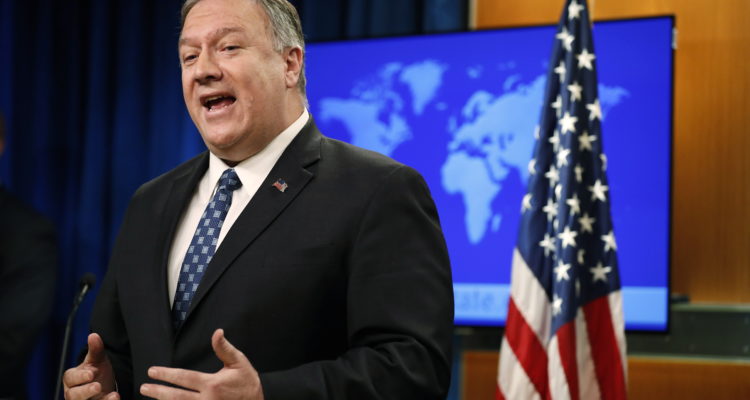Pompeo said that the UN’s release of the blacklist “only confirms the unrelenting anti-Israel bias so prevalent at the United Nations.”
By JNS
On Thursday, U.S. Secretary of State Mike Pompeo expressed his “outrage” over the U.N. Human Rights Council for publishing a blacklist on Wednesday of 112 companies connected to Jewish towns in Judea and Samaria.
“The United States has long opposed the creation or release of this database, which was mandated by the discredited U.N. Human Rights Council in 2016,” he said in a statement released by the U.S. State Department. “Its publication only confirms the unrelenting anti-Israel bias so prevalent at the United Nations.”
Pompeo asserted, “The United States has not provided, and will never provide, any information to the Office of the High Commissioner to support compilation of these lists and expresses support for U.S. companies referenced.”
“We call upon all U.N. member-states to join us in rejecting this effort, which facilitates the discriminatory boycott, divestment and sanction (BDS) campaign and delegitimizes Israel,” he continued. “Attempts to isolate Israel run counter to all of our efforts to build conditions conducive to Israeli-Palestinian negotiations that lead to a comprehensive and enduring peace.”
‘Ammunition for the BDS movement’s anti-Israel campaign’
Jewish and pro-Israel groups also rebuked the United Nations for the move.
“We strongly condemn the issuing of a blacklist by the United Nations Human Rights Council that could be used for discriminatory action against Israel,” said AIPAC in a statement. “This blacklist is clearly designed to target American and Israeli companies for boycotts and other punitive action.”
The pro-Israel lobby continued, “We urge the administration and Congress to act immediately to protect American companies on this list and to prevent American companies from participating in any U.N.-directed boycott against Israel.”
AIPAC also said that “this action is the latest in a deplorable history of attacks on Israel by the U.N. and its agencies. Rather than promoting discriminatory boycotts, the United Nations must demand that the Palestinian leadership return to negotiations with Israel to seek peace and reconciliation.”
“The world body’s endless hypocrisy and double standards towards Israel are staggering,” said American Jewish Committee CEO David Harris in a statement. “Of all the situations in the world in which territory is disputed, the U.N. chooses only to focus on Israel. Why? We call on Secretary-General [António] Guterres to denounce this outrageous assault on the Jewish state.”
“We urge those principled Human Rights Council member states to reject this blacklist, which evokes echoes of Nazi-triggered boycotts and blacklists against Jews, when they convene later this month,” he added. “This initiative should never have received the support of governments seeking to encourage the parties to the Israeli-Palestinian conflict to engage in direct negotiations and pursue an enduring two-state accord.”
In a statement, Anti-Defamation League national director and CEO Jonathan Greenblatt said that “the blacklist will only serve as ammunition for the BDS movement’s anti-Israel campaign, and do nothing to promote constructive initiatives for reconciliation and peace between Israelis and Palestinians.”
“This is perhaps not surprising, considering the UNHRC’s history of obsessively focusing on criticizing Israel while ignoring many human rights abuses and issues occurring throughout the world,” he continued. “By singling out Israel, the UNHRC’s actions also violate a key clause in the widely accepted IHRA definition of anti-Semitism.”
The Israeli-American Coalition for Action (IAC for Action) called the move a double standard.
“Israel is the only country being singled out for such discriminatory treatment and demonization,” said IAC for Action chairman Shawn Evenhaim. “The UNHRC has never released a blacklist for companies operating in disputed territories in any other conflict, though there are nearly 200 others around the world. Ironically, many of the companies included on the UNHCR provide important services and employment to thousands of Palestinian-Arab families as well.”




